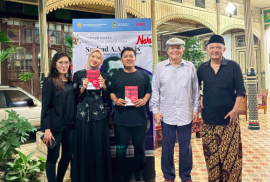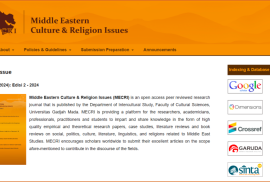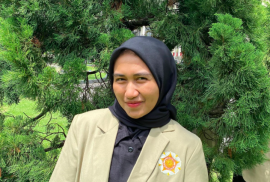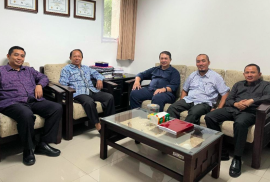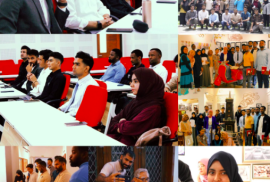Yogyakarta, March 23, 2025 – In an effort to revive the intellectual legacy of one of Indonesia’s greatest literary figures, Toko Buku Natan in collaboration with the Master’s Program in Literature at Universitas Gadjah Mada (UGM) held the Centennial Commemoration of A.A. Navis at Rumah Budaya Ndalem Natan, Kotagede, Yogyakarta. This event attracted literature enthusiasts, academics, and cultural figures eager to explore A.A. Navis’ critical thoughts and contributions to national literary development. Featuring a series of activities, including academic discussions, book launches, an art exhibition, and musical performances, the commemoration became a reflective moment that delved deeper into the social, cultural, and linguistic aspects of Navis’ works.
As one of the most influential figures in Indonesian literature, A.A. Navis gained widespread recognition for his classic short story, Robohnya Surau Kami (The Collapse of Our Mosque), which offered a profound critique of societal structures. Set during the harmonious spirit of Ramadan, this event brought together various stakeholders to discuss Navis’ legacy and critical thoughts, featuring renowned speakers such as Dhianita Kusuma Pertiwi (writer and curator), Prof. Dr. Aprinus Salam (academic and literary scholar), and Nasir Tamara, M.A., M.Sc., Ph.D. (cultural expert). The discussion was further enriched by a cello performance by Lintang Pramudia Swara, providing an aesthetic and immersive experience for the participants.
One of the event’s key highlights was the launch of the book “Kesalahan dan Kejahatan dalam Berbahasa” (Errors and Crimes in Language) by Prof. Dr. Aprinus Salam. This book critically examines language awareness within social and legal contexts. Drawing from his extensive academic and professional experience as an expert witness in various linguistic cases, Prof. Aprinus presents this book as a primary reference for linguistic studies and the role of language in Indonesia’s legal practices.
During the discussion, Prof. Aprinus Salam explored the contrast between social critiques in the works of A.A. Navis and Pramoedya Ananta Toer, highlighting how Navis focused more on critiquing societal structures, while Pramoedya directed his criticisms toward the government and power structures. Meanwhile, Dhianita Kusuma Pertiwi shared her research and archival experience for the 100 Years of A.A. Navis exhibition, held in Jakarta and at UNESCO in Paris. She traced Navis’ educational background at INS Kayutanam, an institution that played a crucial role in shaping his critical thinking, not only in literature but also in music and visual arts.
At the same time, Nasir Tamara, M.A., M.Sc., Ph.D. connected A.A. Navis’ intellectual lineage to the Académie française in Europe, particularly France, which was heavily influenced by the ideas of René Descartes. Citing Descartes’ philosophy “Cogito, ergo sum” (I think, therefore I am), Nasir Tamara emphasized that intellectual awareness and critical thinking are the foundations of a true thinker and writer. This perspective aligns with A.A. Navis’ approach to literary discourse, where he not only documented reality but also challenged, questioned, and inspired social change.
As part of the celebration, Lintang Pramudia Swara delivered a cello performance, enriching participants’ reflective experience. Meanwhile, an art exhibition by renowned artist Anagard featured 11 portraits of prominent Minangkabau figures, including A.A. Navis, Tan Malaka, Sutan Sjahrir, Buya Hamka, and Asrul Sani. This exhibition provided a visual narrative of the intellectual contributions and roles of Minangkabau figures in Indonesia’s national history.
The event also served as a space for literary appreciation, featuring poetry readings by Afnan Malay and a recital of Gurindam 12 by Raja Ali Haji, performed by Nasir Tamara, further enriching the significance and atmosphere of this literary celebration.
During the reflective session, Prof. Aprinus Salam presented two thought-provoking statements for participants to ponder. The first, “Your tongue is sharper than a sword,” underscored the extraordinary power of words in shaping, influencing, and even overturning societal structures. The second, “Words are only sharper for those who are sensitive,” highlighted language as not merely a communication tool but a profound expression with transformative power for those attuned to social and humanitarian realities.
This event was part of a broader initiative to honor great figures in Indonesian literature, following the centennial commemoration of Pramoedya Ananta Toer held earlier. Through the centennial of A.A. Navis, the discussion reinforced awareness of literacy, intellectual heritage, and its relevance to younger generations. Prof. Aprinus Salam emphasized that language possesses transformative power, envisioning a future where short story writers and poets stage protests by reciting poetry in front of legislative buildings, proving that words wield more power than physical weapons.
The event concluded with a communal iftar (breaking of the fast), not only fostering solidarity but also offering a profound reflection on the role of literature in shaping social and cultural consciousness. Toko Buku Natan, in collaboration with the Master’s Program in Literature at UGM, remains committed to facilitating academic discussions, literary forums, and various literacy initiatives to support intellectual and cultural development in Indonesia.
[Public Relations Magister of Literature, Anisa Dien Rahmawati]

